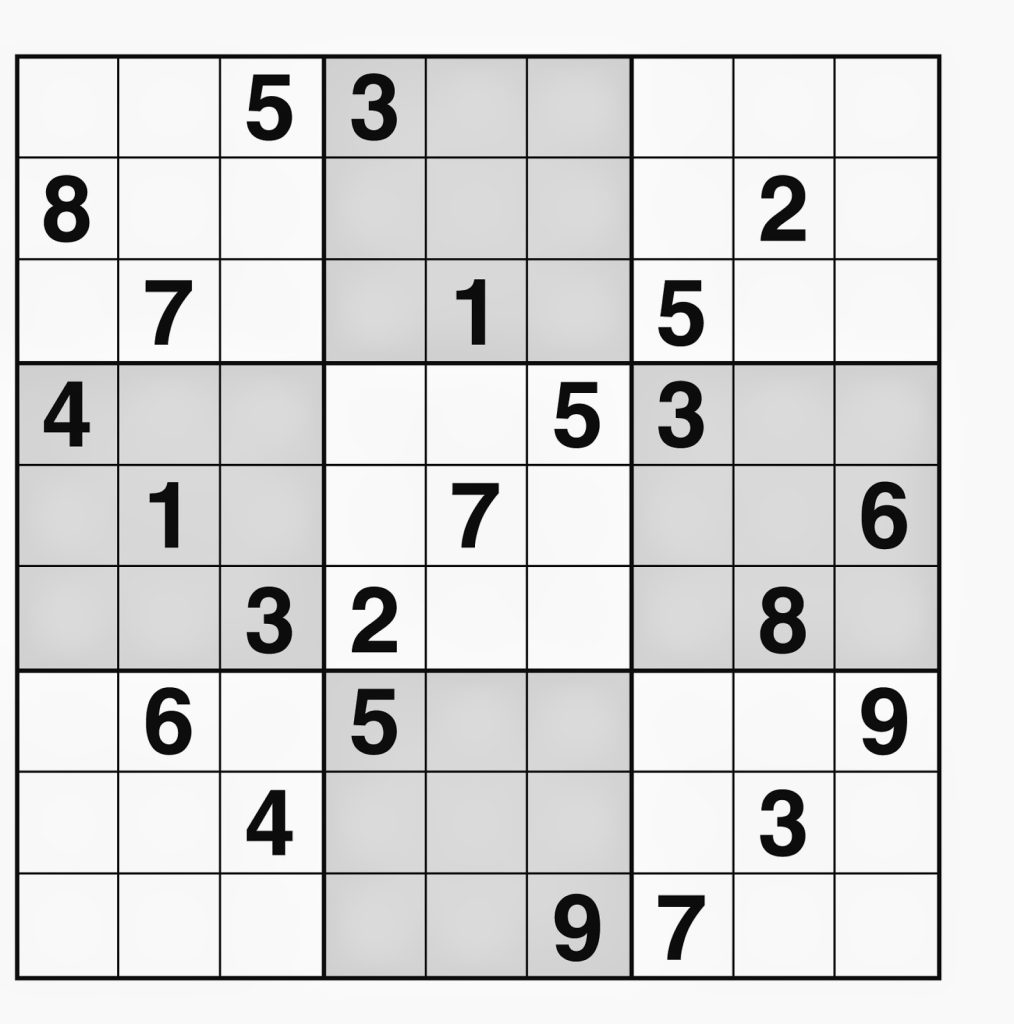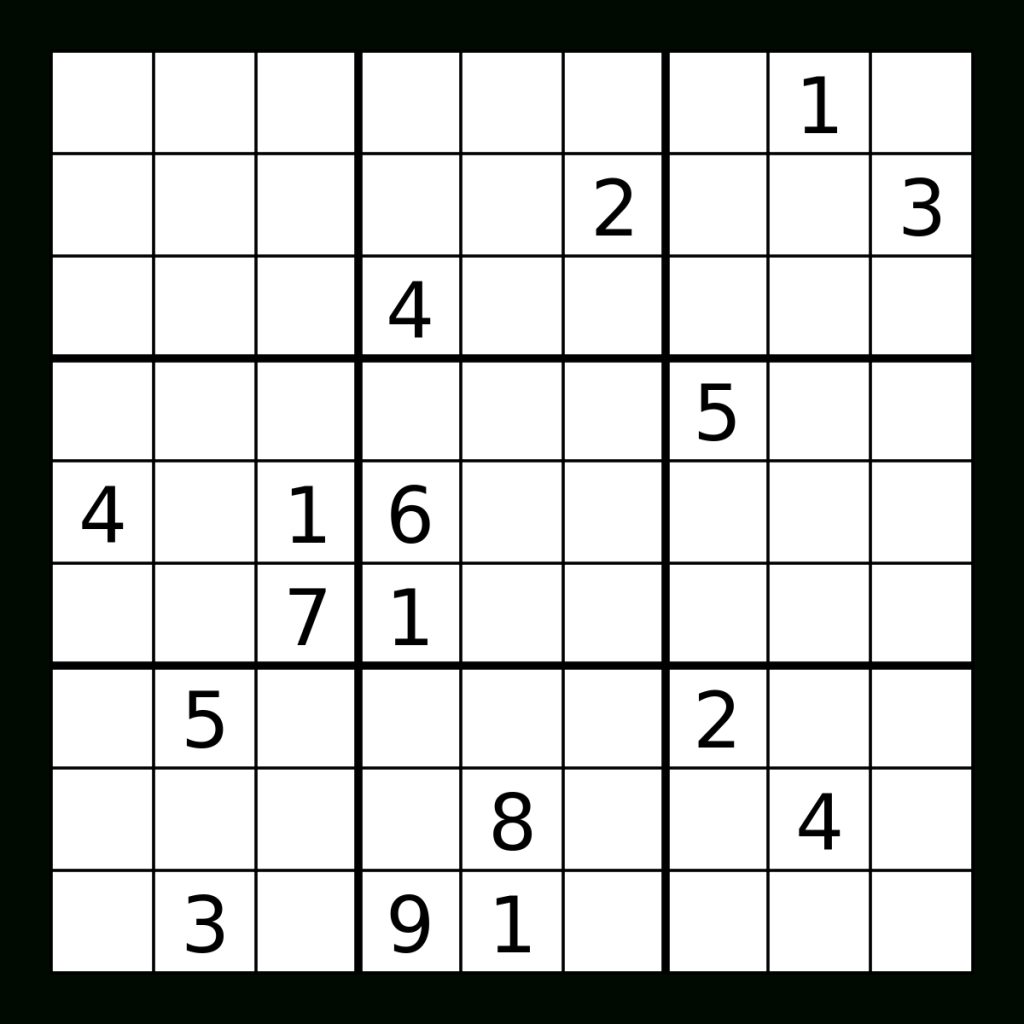In the vast landscape of puzzles and mind games, few have achieved the worldwide appeal and enduring popularity of Sudoku. Originating from humble number puzzles, Sudoku has transformed into a global phenomenon, captivating enthusiasts across generations. Amidst the digital age’s myriad distractions, the simplicity and intellectual challenge of Sudoku puzzles have found a special place in the hearts of millions. While digital versions abound, printable Sudoku puzzles offer a tangible, portable, and deeply engaging experience that delves into the core of logical thinking and pattern recognition.
The Intriguing Origins of Sudoku:

Sudoku, as we know it today, has a fascinating history that spans cultures and centuries. Its origins can be traced back to ancient number puzzles in various forms, but the modern Sudoku puzzle was crafted by Howard Garns, an American architect, in the late 1970s. Garns created the puzzle, initially named “Number Place,” with a simple set of rules: a 9×9 grid divided into 3×3 subgrids, with the objective of filling the grid so that each row, column, and subgrid contains all the numbers from 1 to 9. The puzzle’s journey from an obscure invention to a global phenomenon is a testament to its universal appeal.
Sudoku’s Enduring Allure:
At its core, Sudoku offers a perfect balance of challenge and accessibility. Its rules are straightforward, making it easy for beginners to grasp, yet the puzzles can range from simple to highly complex, providing a continuous challenge for enthusiasts. Sudoku’s appeal lies in its ability to engage the brain’s logical faculties, encouraging players to analyze patterns, apply deductive reasoning, and think several steps ahead. This intellectual stimulation, coupled with the satisfaction of completing a puzzle, creates a sense of accomplishment that keeps players coming back for more.
Printable Sudoku Puzzles: Where Convenience Meets Complexity:
In the digital age, the convenience of printable Sudoku puzzles cannot be overstated. Enthusiasts can access a vast array of puzzles online, spanning various difficulty levels and grid sizes. With a few clicks, these puzzles can be downloaded and printed, transforming a digital format into a tangible, handheld experience. The act of holding a physical puzzle grid and marking it with a pencil adds a sensory dimension to the solving process. This tactile engagement enhances concentration and provides a deeply satisfying connection between the player and the puzzle.
Moreover, printable Sudoku puzzles offer a portable way to carry this brain-teasing pastime wherever one goes. Whether on a long flight, during a commute, or while relaxing in a park, Sudoku puzzles provide a mentally stimulating diversion that fits seamlessly into various aspects of daily life. The convenience of printable Sudoku puzzles makes it an ideal companion for individuals seeking intellectual challenges on the go.
Cognitive Benefits of Sudoku: Exercising the Brain Muscles:
Beyond the immediate thrill of solving a puzzle, Sudoku offers a plethora of cognitive benefits that make it a valuable exercise for the brain. Regular engagement in Sudoku has been linked to improved memory functions, enhanced concentration, and sharpened analytical skills. The process of identifying patterns, making logical deductions, and evaluating possibilities in Sudoku puzzles stimulates neural pathways, promoting mental agility and flexibility.
Sudoku puzzles also foster the development of problem-solving skills. Players learn to approach challenges systematically, break down complex problems into manageable parts, and test different strategies to find solutions. These problem-solving abilities cultivated through Sudoku are transferrable to various real-life situations, enhancing the player’s capacity to tackle everyday challenges with confidence and creativity.
Additionally, Sudoku provides an excellent opportunity to develop patience and perseverance. Some puzzles, especially those of higher difficulty levels, require players to navigate through moments of uncertainty and consider multiple scenarios before finding the correct solution. This process instills resilience and teaches individuals the value of persistence in the face of challenges, reinforcing the importance of not giving up when faced with difficulties.
Sudoku: A Social and Educational Tool:

Beyond its individual benefits, Sudoku has found its way into social and educational contexts. In educational settings, Sudoku puzzles are utilized as teaching tools to enhance students’ critical thinking skills and promote mathematical reasoning. The structured nature of Sudoku puzzles aligns with mathematical concepts, making it an engaging way to introduce and reinforce math skills among students. Additionally, educators have observed the positive impact of Sudoku on students’ attention spans and problem-solving abilities, making it a valuable addition to the educational toolkit.
In social contexts, Sudoku has become a unifying force. Sudoku enthusiasts gather in clubs and online communities to share solving strategies, discuss puzzle variations, and organize competitions. These interactions foster a sense of camaraderie among puzzle lovers, creating a supportive environment where individuals can learn from one another and celebrate their shared passion for Sudoku. The social aspect of Sudoku transforms it from a solitary pursuit into a collaborative and enriching experience, demonstrating the power of puzzles to connect people from diverse backgrounds and cultures.
Sudoku Variations: Exploring the Boundless Possibilities:
One of the most appealing aspects of Sudoku is its adaptability. While the standard 9×9 Sudoku grid is the most well-known format, Sudoku puzzles come in various sizes and shapes. Mini-Sudoku, Mega-Sudoku, Irregular Sudoku, and Diagonal Sudoku are just a few of the numerous variations that enthusiasts can explore. Each variation introduces unique challenges, such as irregularly shaped subgrids or additional diagonal constraints, pushing players to adapt their strategies and think creatively.
The availability of printable puzzles for these variations adds a new layer of excitement for Sudoku aficionados. Enthusiasts can explore different Sudoku types, mastering the intricacies of each variant and expanding their puzzle-solving repertoire. This exploration not only provides endless hours of entertainment but also enhances the player’s problem-solving skills by exposing them to diverse puzzle structures and rules.
Sudoku and the Mind-Body Connection:
The benefits of Sudoku extend beyond the cognitive realm, touching upon the mind-body connection. Engaging in Sudoku puzzles has been associated with stress reduction and relaxation. The focused attention required for puzzle-solving diverts the mind from daily worries and anxieties, creating a meditative experience. In these moments of concentration, players enter a state of flow, where the challenges of the puzzle and the skills of the player are perfectly balanced. This flow state induces a sense of mindfulness, where the individual is fully immersed in the present moment, free from distractions and concerns.
Furthermore, the satisfaction derived from completing a Sudoku puzzle triggers the release of endorphins, the body’s natural feel-good chemicals. This sense of accomplishment and the accompanying rush of positive emotions contribute to an overall sense of well-being. Sudoku, therefore, serves as a holistic activity that not only exercises the mind but also nurtures emotional and mental well-being, promoting a balanced and harmonious lifestyle.
Sudoku: A Timeless Legacy and an Ever-Present Challenge:
In the grand tapestry of human intellectual pursuits, Sudoku stands as a testament to the timeless appeal of logic, numbers, and patterns. Its ability to captivate minds, foster connections, and provide a sense of accomplishment transcends cultural boundaries and technological advancements. Printable Sudoku puzzles, with their accessibility and convenience, continue to carry the torch of this venerable tradition, ensuring that the challenge of Sudoku remains within reach of puzzle enthusiasts around the world.
As individuals print out Sudoku grids, armed with pencils and erasers, they embark on a journey that goes beyond the confines of a mere puzzle. They engage in a mental odyssey that sharpens their intellect, enhances their problem-solving abilities,
and brings them into a community of like-minded enthusiasts. Sudoku becomes not just a pastime but a way of life—a celebration of the intricate dance between numbers and the human mind.
In the quiet moments spent hunched over a puzzle, solving, erasing, and solving again, individuals connect with generations of thinkers who have reveled in the joy of numbers. In the intricate grids and the careful placement of digits, there lies a profound truth: the world of Sudoku is not just about finding the right numbers but about discovering the boundless potential of the human intellect. As long as there are minds eager to explore, patterns waiting to be deciphered, and challenges beckoning to be overcome, Sudoku will endure as a beloved pastime, offering a timeless invitation to unravel the mysteries of numbers and revel in the infinite possibilities of the human brain. So, the next time you print out a Sudoku puzzle, remember that you are not merely engaging in a game; you are participating in a legacy—a legacy of intellect, perseverance, and the unyielding fascination with the beautifully enigmatic world of numbers.